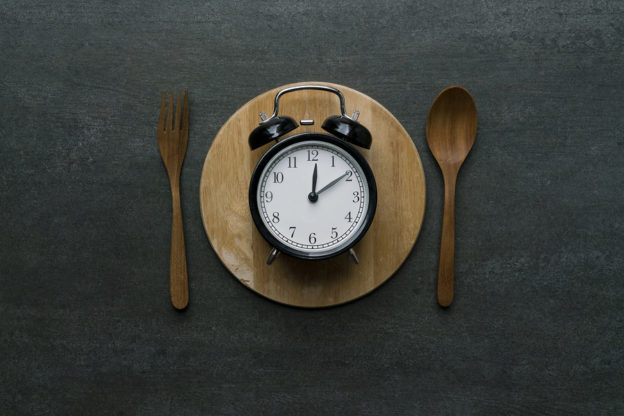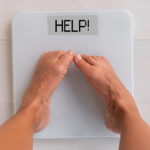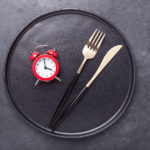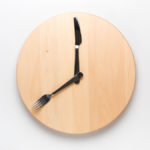By David Blyweiss, M.D., Advanced Natural Wellness
February 5, 2018
- Eating too much at all of the wrong times
- Here’s what happens if you never get hungry
- Meal timing strategy triggers your body’s ancient cleansing system
For our entire lives we’ve been told to eat three square meals a day.
Some people eat even more than that – snacking all day and well into the evening so that they never get hungry. And for some unknown reason, the majority of folks here in the U.S. eat for an average of 15 hours or longer each day.
Not only are we eating too much and too often, we’re also eating the bulk of our foods at the wrong time of the day. (If you’re like most Americans, you probably eat several small meals and snacks during the day, followed by a big evening meal.)
This may be a driving factor in the obesity epidemic… and presents more health risks than you might imagine.
Here’s What Happens if you never Get Hungry
MD Exposes the Hidden Danger to Your Eyes

When your eyesight starts to fail, it's a real problem. Suddenly you can't go to the grocery store... you can't get to the doctor if you have an emergency... you can't meet your friends for dinner…
Your "regular" doctor doesn't have time to keep up with the latest research. And the same goes for eye doctors. They go to school to learn how to fit you for glasses and contacts, but have no way of preventing the damage and loss of eyesight that threatens your freedom and independence.
Let me show you something that explains a LOT about how your eyes work.
In my FREE Special Report, I'll show you a HUGE, untapped resource for your eyes that safely and naturally restores clear, effortless eyesight.
Click here to get started...
If you never give yourself an opportunity to get hungry, you’re depriving your body of an ancient, internal cleansing system that revitalizes your cells. It’s a natural mechanism called autophagy, and it’s a very significant biological process when it comes healthful aging.
When this mechanism is triggered, it helps you get rid of old, malfunctioning mitochondria and replace them with new ones. These are what power every cell in your body with youthful energy… your brain, heart, muscles and other organs.
Autophagy also helps break down misfolded proteins and other cellular waste. So it’s a huge boost to your immune system and helps protect your body from infections, autoimmune disorders and inflammatory diseases.
However these days we rarely enter a state of hunger. As a result, we maintain extremely low levels of autophagy. Insufficiency in this process is associated with the development of cancer; neurological disorders like Alzheimer’s, Parkinson’s and Huntington’s; microbial infection and advanced aging.
But when autophagy is fully activated, it can protect you from physical impairment, protect your brain and heart, and shelter you from metabolic disorders and weight gain.
So what can you do to activate this process?
How to Trigger Your Body’s Ancient Cleansing System
The World's Quickest Solution for Ending Prostate and Urinary Misery
This has recently been revealed to be one of the only real breakthroughs in prostate health.
The seeds of a strange fruit (sometimes called "Chinese Apples") hold powerful phytonutrients that are a revolution in prostate health.
In fact, UCLA and Veterans Administration research have now proved this to be true.
Not only that, but it may be the worlds quickest solution for ending prostate misery.
Simply stated, these phytonutrients represent a huge step beyond beta sitosterol, saw palmetto, and other phytosterols alone.
Simply click HERE if you want to have fast prostate relief...restful, uninterrupted sleep...no more constant "urges to go"...enhanced virility...and optimal prostate support for life.
Both calorie restriction and fasting are associated with increased autophagy. But if you’re a constant eater, these concepts may sound a little scary.
That’s why I want to introduce you to an extremely simple meal-timing strategy that triggers this ancient mechanism, reduces hunger swings and may even help you lose weight. And it doesn’t require starving yourself.
The key is to designate a window of six to eight hours each day to enjoy regular meals. Then fast for the remaining 16 to 18 hours.
During the fasting period, your body will automatically enter several processes (including autophagy) that can help optimize your health and slow down the aging process… and you don’t have to skip meals or reduce calorie intake to do it.
Here is a quick example.
Hour 1: Eat your largest meal of the day at breakfast – which literally means “breaking the fast”. Include a high-quality protein along with plant-based carbohydrates. But make the protein the focal point since it’s what will keep you powered up throughout the day.
Some good protein choices include eggs, wild-caught fish, plain Greek yogurt, almonds, avocado, pasture-raised poultry, beans, sesame and pumpkin seeds, and grass-fed beef. Plant-based carbohydrates – which will also support your fiber needs – include most fruits and vegetables.
Hour 3-4: At lunchtime, opt for a smaller meal. As with breakfast, zero in on protein and plant-based carbs to keep you fueled and steady as the afternoon wears on.
Hour 6-8: Load your plate with non-starchy veggies from any and all colors of the rainbow. These foods are absorbed slowly since they’re high in fiber. That means they’ll help control your blood sugar and hunger until you break your fast the following day. (It’s okay to throw in a little protein at this meal, but keep it to a minimum.)
You can schedule your meals within any six to eight hour time window that suits your lifestyle. Just remember to start your eating schedule with the largest meal of the day, and end it with the smallest.
SOURCES:
Salk scientists show how timed feeding could help fight “metabolic jetlag”. News Release. Salk University. Sept 2015.
Mizushima N, et al. Autophagy fights disease through cellular self-digestion. Nature. 2008 Feb 28;451(7182):1069-75.
Li Z, et al. Autophagy ameliorates cognitive impairment through activation of PVT1 and apoptosis in diabetes mice. Behav Brain Res. 2016 May 15;305:265-77.
Li M, et al. Crosstalk between Autophagy and Apoptosis: Potential and Emerging Therapeutic Targets for Cardiac Diseases. Int J Mol Sci. 2016 Mar 3;17(3):332.
University of Alabama at Birmingham. “Time-restricted feeding study shows promise in helping people shed body fat.” ScienceDaily. Jan 2017.







